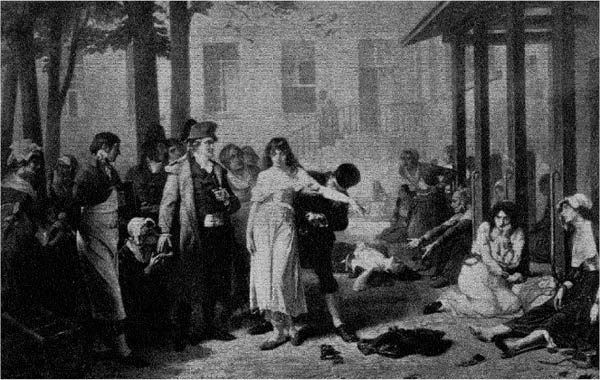THE MENTALLY ILL
IN AMERICA
A HISTORY OF
THEIR CARE AND TREATMENT
FROM COLONIAL TIMES
By ALBERT DEUTSCH
WITH AN INTRODUCTION BY
WILLIAM A. WHITE, M.D., D.Sc., LL.D.
Late Superintendent, St. Elizabeths Hospital,
Washington, D. C.; Professor of Psychiatry,
George Washington University

CONTENTS
by William A. White, M.D. |
. |
. |
. |
. |
. |
. |
. |
. |
. |
. |
. |
. |
. |
. |
. |
. |
. |
. |
. |
. |
. |
ILLUSTRATIONS
INTRODUCTION
IT IS with deep satisfaction that I introduce this important book to the reading public. If the lessons it teaches are understood and taken to heart by its readers, society will be the authors debtor.
Mr. Deutschs book, the preparation of which has been made possible by the American Foundation for Mental Hygiene, might be described in a very few words by saying that it traces the evolution of a cultural pattern as represented by the way in which people through the years have thought and felt about the so-called insane. It is an exceedingly illuminating presentation and because of the dramatic material with which it deals, it may well prove to be a spearhead for the penetration of important social facts and the understanding of social processes which, presented with less appealing or less startling illustration, might fail to attract attention.
It is altogether fitting that in the presentation of this extraordinary and important story of mans struggles with himself, the illustrations should be taken more particularly from their American setting. In this way the whole matter is brought home to us who live in this country and we see what has actually been taking place, more especially since early colonial days, and we can feel that we ourselves are a part of the whole story and that the victories that have been won and the ground that has been gained are assets of which we can avail ourselves. It is always an illuminating procedure to trace the path along which we have come, to become acquainted with the historical forces that are driving us, and their directions, because after all we have to conquer, not by opposing these forces, but by conforming to them. Mr. Deutschs story, therefore, while it, may make us ashamed of some aspects of our past and proud of others, offers hope for the future through the realization that the goals toward which we have directed our vision can be attained, but only at the price of unremitting and indefatigable effort. If we are willing to undertake the task, we can feel assured of the future. It is but another instance of the necessity for eternal vigilance if past gains are not to be lost. It is and has been the function of the National Committee for Mental Hygiene, through all the years since its beginning, to symbolize and to exercise this very function of vigilance, sustained by the unflagging faith of its prescient creator, Clifford W. Beers. Though very different in content and approach, this book resembles in a significant way Mr. Beerss classic autobiography, A Mind That Found Itself, since it is intended not merely to entertain or inform, but to stimulate to constructive action.
A great amount of research has gone into the making of this book. Hundreds of treatises, reports, articles, and pamphlets have been consulted by Mr. Deutsch in its preparation. His approach to the subject as a social historian rather than as a psychiatrist makes possible an objective view free from the temptations of professional partisanship. His data have been gathered with scrupulous care. Interpretations, where they occurand they are more often implicit in the text than explicitflow naturally from the facts.
Mans inhumanity to man is an old theme, so old, in fact, that people repeat the phrase with little appreciation of what lies behind the words in terms of actual human suffering. The inhumanity, however, has its foundations in a background of ignorance and misconceptions. Thus in this book we see that inhumanity, with all the ugly facts of ignorance from which it takes root, expressing itself in the end results, not only of neglect, but of actual abuse directed against the helpless and those unable to defend themselves or to retaliate. The average reader, as he follows the presentation from chapter to chapter, will find that the whole ugly story is only too easy to understand. Personal ambition, cupidity, cowardice, all the selfish and hateful passions of man, are seen unleashed here in all their fury; we have only to read the daily press today to see instances of the same kind staring at us from its pages. But, as Mr. Deutsch is at pains to point out, the conditions described in this book are primarily attributable, not to the emotional and mental make-ups of particular individuals, but to broad-based public attitudes corresponding closely to the general manners and mores and to societys phase of development at each stage of its evolution. In the final analysis, too, the effects of such conditions are rather social than individual in their implications.
In the somewhat vague terms of oriental mysticism, this might very well be expressed in the words of Buddha, who said: Not in the sky, nor in the midst of the sea, nor in the clefts of the mountains, is there known a spot where a man can be freed from an evil act. To put this concept in somewhat more concrete and understandable terms, I will point an analogy. The public health movement came originally into existence by no means as a pure, altruistic effort to save the lives and health of the factory workers who were laboring fourteen, sixteen, and more hours a day under atrocious conditions of light, ventilation, food, poverty and filth. The real impelling force that started movements in this direction was the fact that these degraded human beings were the easy prey of disease. Contagions and infections spread rapidly among them, and when they lived, as they often did, in close proximity to the rich mans home, disease, being proverbially no respecter of persons, often found its mark there. The factory owner and the man of wealth, therefore, found in this roundabout way that in order to protect themselves it was necessary to produce different conditions among their employees. This was simply self-preservation.
Here in this book, therefore, the reader may see unfold before him with reference to a particular cultural pattern, a form, model or paradigm into which probably all social movements might reasonably fit. He will see how great personalities stand out as nuclear points about which latent tendencies accumulate and become active by way of their leadership. He will see that progress does not take place in two or even three, but in four dimensions, that the historical unfoldment of a story such as this can not be understood solely from its linear presentation page after page, but must be thought of in all these dimensions, reforms in certain places having progressed further than in others, reforms at certain times having advanced more rapidly and accomplished more than similar efforts at other times. And so he will be prepared to understand the whole complex picture as it is distributed in time and space as the author presents it, and he will realize that the classification of what has happened through the years by chapter headings is but a convenient method of presenting the material which the author, from his point of view, with his vision and background, feels to be most desirable and most practicable. In integrating, wherever possible, the historical process in one particular field of human endeavor with the general cultural pattern, Mr. Deutsch makes an impressive contribution to this kind of historical literature. He has, with much success, resisted the temptation to treat his subject as an entity isolated from the social stream.








